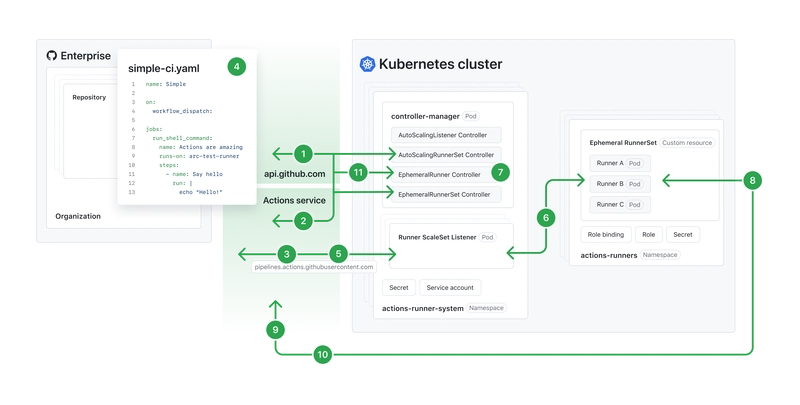How to Write a Multithreaded File Processor in Rust With Channels and Thread Pools
Rust's ownership model and safe concurrency make it a strong candidate for writing high-performance multithreaded applications. In this article, we’ll build an advanced file processor that distributes file processing tasks across a thread pool using Rust's standard library. 1. Project Setup Start by creating a new project: cargo new multithreaded_processor cd multithreaded_processor Open main.rs and import the required modules: use std::fs; use std::path::PathBuf; use std::sync::mpsc; use std::thread; use std::time::Duration; use std::sync::{Arc, Mutex}; use std::env; 2. Thread Pool Setup We’ll define a simple thread pool to handle concurrent file processing. fn create_thread_pool(size: usize) -> Vec { let (tx, rx) = mpsc::channel(); let rx = Arc::new(Mutex::new(rx)); let mut handles = vec![]; for _ in 0..size { let rx = Arc::clone(&rx); let handle = thread::spawn(move || { while let Ok(path) = rx.lock().unwrap().recv() { process_file(path); } }); handles.push(handle); } (tx, handles) } 3. File Processing Logic Here’s a dummy file processing function that simulates computation with thread::sleep: fn process_file(path: PathBuf) { println!("Processing: {:?}", path); // Simulate time-consuming work thread::sleep(Duration::from_millis(500)); let contents = fs::read_to_string(&path).unwrap_or_else(|_| "Failed to read file".into()); println!("Content of {:?} (first 100 chars): {}", path, &contents[..contents.len().min(100)]); } 4. Sending Work to the Pool In the main function, discover files in a directory and send them to the thread pool: fn main() { let args: Vec = env::args().collect(); let dir = if args.len() > 1 { &args[1] } else { "." }; let (tx, handles) = create_thread_pool(4); for entry in fs::read_dir(dir).unwrap() { let path = entry.unwrap().path(); if path.is_file() { tx.send(path).unwrap(); } } drop(tx); // Close the channel for handle in handles { handle.join().unwrap(); } println!("All files processed."); } 5. Running the Program To run the file processor on the current directory: cargo run -- . To process another directory, pass it as an argument: cargo run -- ./my-files Conclusion This example demonstrates how to efficiently distribute work in Rust using channels and threads without relying on external libraries. For production workloads, consider using the rayon or tokio crates for more advanced concurrency models. If this project helped you learn or build something cool, consider supporting me here: buymeacoffee.com/hexshift

Rust's ownership model and safe concurrency make it a strong candidate for writing high-performance multithreaded applications. In this article, we’ll build an advanced file processor that distributes file processing tasks across a thread pool using Rust's standard library.
1. Project Setup
Start by creating a new project:
cargo new multithreaded_processor
cd multithreaded_processorOpen main.rs and import the required modules:
use std::fs;
use std::path::PathBuf;
use std::sync::mpsc;
use std::thread;
use std::time::Duration;
use std::sync::{Arc, Mutex};
use std::env;
2. Thread Pool Setup
We’ll define a simple thread pool to handle concurrent file processing.
fn create_thread_pool(size: usize) -> Vec> {
let (tx, rx) = mpsc::channel();
let rx = Arc::new(Mutex::new(rx));
let mut handles = vec![];
for _ in 0..size {
let rx = Arc::clone(&rx);
let handle = thread::spawn(move || {
while let Ok(path) = rx.lock().unwrap().recv() {
process_file(path);
}
});
handles.push(handle);
}
(tx, handles)
}
3. File Processing Logic
Here’s a dummy file processing function that simulates computation with thread::sleep:
fn process_file(path: PathBuf) {
println!("Processing: {:?}", path);
// Simulate time-consuming work
thread::sleep(Duration::from_millis(500));
let contents = fs::read_to_string(&path).unwrap_or_else(|_| "Failed to read file".into());
println!("Content of {:?} (first 100 chars): {}", path, &contents[..contents.len().min(100)]);
}
4. Sending Work to the Pool
In the main function, discover files in a directory and send them to the thread pool:
fn main() {
let args: Vec = env::args().collect();
let dir = if args.len() > 1 { &args[1] } else { "." };
let (tx, handles) = create_thread_pool(4);
for entry in fs::read_dir(dir).unwrap() {
let path = entry.unwrap().path();
if path.is_file() {
tx.send(path).unwrap();
}
}
drop(tx); // Close the channel
for handle in handles {
handle.join().unwrap();
}
println!("All files processed.");
}
5. Running the Program
To run the file processor on the current directory:
cargo run -- .To process another directory, pass it as an argument:
cargo run -- ./my-filesConclusion
This example demonstrates how to efficiently distribute work in Rust using channels and threads without relying on external libraries. For production workloads, consider using the rayon or tokio crates for more advanced concurrency models.
If this project helped you learn or build something cool, consider supporting me here: buymeacoffee.com/hexshift










































































































































































![[The AI Show Episode 144]: ChatGPT’s New Memory, Shopify CEO’s Leaked “AI First” Memo, Google Cloud Next Releases, o3 and o4-mini Coming Soon & Llama 4’s Rocky Launch](https://www.marketingaiinstitute.com/hubfs/ep%20144%20cover.png)


















































































































![[DEALS] The All-in-One Microsoft Office Pro 2019 for Windows: Lifetime License + Windows 11 Pro Bundle (89% off) & Other Deals Up To 98% Off](https://www.javacodegeeks.com/wp-content/uploads/2012/12/jcg-logo.jpg)





































![Is this too much for a modular monolith system? [closed]](https://i.sstatic.net/pYL1nsfg.png)






















































































































_Andreas_Prott_Alamy.jpg?width=1280&auto=webp&quality=80&disable=upscale#)
































































































![What features do you get with Gemini Advanced? [April 2025]](https://i0.wp.com/9to5google.com/wp-content/uploads/sites/4/2024/02/gemini-advanced-cover.jpg?resize=1200%2C628&quality=82&strip=all&ssl=1)













![Apple Shares Official Trailer for 'Long Way Home' Starring Ewan McGregor and Charley Boorman [Video]](https://www.iclarified.com/images/news/97069/97069/97069-640.jpg)
![Apple Watch Series 10 Back On Sale for $299! [Lowest Price Ever]](https://www.iclarified.com/images/news/96657/96657/96657-640.jpg)
![EU Postpones Apple App Store Fines Amid Tariff Negotiations [Report]](https://www.iclarified.com/images/news/97068/97068/97068-640.jpg)
![Apple Slips to Fifth in China's Smartphone Market with 9% Decline [Report]](https://www.iclarified.com/images/news/97065/97065/97065-640.jpg)




































































































































